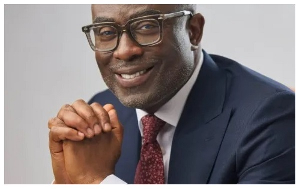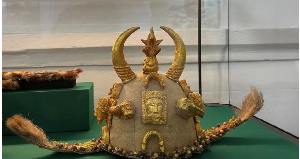- Home - News
- TWI News | TV
- Polls
- Year In Review
- News Archive
- Crime & Punishment
- Politics
- Regional
- Editorial
- Health
- Ghanaians Abroad
- Tabloid
- Africa
- Religion
- Election 2020
- Coronavirus
- News Videos | TV
- Photo Archives
- News Headlines
- Press Release
General News of Monday, 23 April 2001
Source: Public Agenda
OPINION: Kufuor's Big Gamble -Did He Win Or Lose?
 To be bombarded by the press live on radio and TV without any chance of knowing beforehand the nature of questions is something sitting Presidents do not ordinarily relish.
To be bombarded by the press live on radio and TV without any chance of knowing beforehand the nature of questions is something sitting Presidents do not ordinarily relish.
So it certainly took some guts for President John Kufuor to offer himself to be grilled live by the media last Wednesday.
It was the President's first press conference since he assumed office on January 7, and it was meant to give a public account of his first 100 days in office. It was also the first of its kind in the country in the last 20 years, and in terms of the live broadcast, probably the first in the nation's history.
Criticised by opponents as hesitant and not always prepared for press quizzes, the President's decision 'to bite the bullet' seemed like a huge gamble.
Many observers, including NPP sympathisers, were apprehensive about the performance the President was going to put up.
The big press confab has come and gone and the overall view is that Kufuor did well; coming off as a confident, friendly and fairly sincere person. But there were also some major slips which his aides have since been working hard to repair.
Well known critics of the new government, Ekwow Spio-Garbrah former Minister of Education and Doe Adjahoe, NDC Chief Whip in Parliament, said the press conference was a brilliant idea and a plus for democracy.
Spio-Garbrah praised Kufuor for seizing the initiative to meet the media. He said on Komla Dumor's breakfast show on Joy FM radio last Thursday that the President did better than previously in terms of articulation, presentation and confidence.
Other observers say Kufuor came across a couple of times as a humorous and humane person. The President drew laughter and applause from the packed press conference when he said in response to a question on whether the Volta Region would get its fair share of the national cake that his government did not meet any "national cake" but national debt. Therefore any region which wanted it, could have its share of the country's ?41 trillion debt.
The fact too that there was no attempt to censor and stage-manage the questions, did a lot to reinforce the sense of confidence exuded by the President.
But a number of pundits have also underlined the fact that Kufuor slipped badly on many occasions. Expectedly, the media has found these embarrassing mistakes too juicy to ignore.
Two biggest goofs, according to most observers, were the President's response to questions on the involvement of a supposedly Nigerian-owned company; Sahara Limited in lifting crude oil to Ghana from Nigeria. Earlier press reports had linked some NPP sympathisers to the company.
Kufuor said what is important for him was the fact that he has been able to secure the regular supply of oil to Ghana especially as the supply was in danger. He said how the crude is lifted to Ghana was secondary.
Secondary does not mean not important, but the response left unanswered the issue as to whether the arrangement was above board or not.
The President also badly bungled a question on why the Upper West Region is not represented in his 19-member cabinet.
Even though he had earlier hinted that there are other capacities citizens of the region might be assigned. He almost wasted that when he added that he could not find anybody from the region he could work with in his cabinet.
A deputy government spokesman, Kwabena Agyapong, relentlessly tried to put a spin on these faux pas last week. Asked by Joy's Sonny Decker about this particular quote, he said it was an unfortunate slip and added that everyone makes a slip once in a while.
Because the first 100 days has been so eventful, most of time of the press confab was used by the President to explain why specific decisions were taken in the 100 days. Topping the charts still is Ghana's accession to HIPC.
"In deciding to opt for the HIPC initiative, we sought to give ourselves a respite from debt payments and to have released to us, resources to be used for the immediate task of social investment," he said.
But on this issue, Spio-Garbrah countered during his interview on Joy that the NPP government should have found out from the NDC how the latter was able to manage without HIPC.
Some Ministry sources say the NDC government wrestled with HIPC and would have sought refuge as well but for implicit threats from the Japanese government. Ironically despite the toing and froing over HIPC, a snap survey by Public Agenda shows that most people still do not know what exactly it entails but have strong views on it.
Putting his time in power in context, Kufuor explained that his government spent the first 100 days getting a hand round government structures "which had been established, controlled and nurtured for nineteen years by the same group of persons in pursuit of a vision totally different from our own."
That vision is what most ordinary people would want clarified and brought to their doorstep, ideally in terms of a better standard of living. For the time being, it is assumed to contain the NPP's election manifesto, elements of major addresses by the President - at his inauguration, in his Sessional address to Parliament and at last Wednesday's press conference.
Often cited is the government's belief in the private sector to power the economy, the regime's belief in democracy and its distaste for corruption.
Government supporters can cite concrete instances to support all of these goals just critics also point to deviations from these or give the credit to the former ruling party, the NDC.
Symbolically at least, the Castle, whose mere mention was enough to evoke fear, was the venue of the conference. And for those used to the intimidating atmosphere of the place during the past two controversial decades, the air of freedom was palpable.
Understandably, some Castle workers looked on with surprise and others with delight as the media mixed with the President and his Ministers.
However suggestions from some quarters to the contrary, the first President Kwame Nkrumah, Generals Acheampong and Akuffo, and President Limann all faced the press at one time or the other. It can be argued though that under some regimes the atmosphere of fear prevented journalists from asking 'controversial' questions.
Ex-President Jerry Rawlings granted interviews to foreign but not the local media.
The media generally welcomed the press conference as a positive departure from the past 20 years. They asked for more of such interactions.
The Ghanaian Chronicle described it as an "epochal news conference" and asked every Ghanaian to congratulate the government in its Friday edition.
"Every sense of the word, this government should be congratulated on taking this bold decision to level with the media ." Chronicle said.
"Kufuor in full control" was how the newspaper, one of the fiercest critic of the former regime described the news conference in a front-page story of Thursday, April 19.
The paper drew a contrast between Kufuor, the NPP presidential candidate and Kufuor, the President of Ghana.
State-owned Daily Graphic in an editorial titled "More of such dialogue, Mr. President" said the event was historic" and "beneficial".
The Daily Graphic however warned that the country should not copy wholesale the celebration of 100 days hook, line and sinker.
Contributors to discussion programmes on the capital's FM radio stations generally patted the President on the back.
But some questioned his grasp of issues. A contributor asked the President to explain his stance of appointing people from the Upper West Region to cabinet while another disagreed with his answer on the arrangement on lifting crude oil from Nigeria to Ghana.
Opinions









